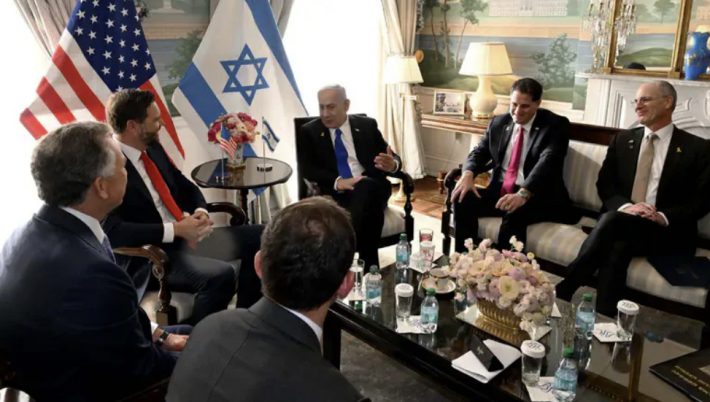History will judge Trump and Netanyahu not by their handshakes and public camaraderie, Netanyahu’s Washington Visit: Promise, Peril, and the Pursuit of Lasting Peace.
Prime Minister Benjamin Netanyahu’s high-stakes visit to Washington, which included meetings with former President Donald Trump and senior members of Congress, underscored the dual nature of current U.S.–Israel relations—one defined by historic opportunity and deep strategic risks.
On the surface, the visit offered the optics of unity and progress. Netanyahu and Trump signaled cautious optimism for a phased ceasefire in Gaza that would secure the release of hostages and facilitate measured Israeli withdrawals, potentially leading to a wider regional realignment. The discussions rekindled hopes that the IDF’s weary reservists might soon return to their families after extended deployments.
Beneath the diplomatic choreography, however, the situation remains fraught. The war in Gaza continues, humanitarian concerns persist, and domestic political pressures in both Jerusalem and Washington threaten to skew strategy toward short-term gains. What was framed as a turning point could, if mismanaged, exacerbate tensions and undermine Israel’s moral standing, a cornerstone of its alliance with the United States.
A Moment of Strategic Opportunity
Amid these complexities, there were clear signs of progress. U.S. diplomatic efforts have reinvigorated proposals that link hostage releases with Israeli drawdowns, backed by security guarantees. Both leaders emphasized the possibility of a breakthrough, with Netanyahu further bolstering goodwill by nominating Trump for the Nobel Peace Prize—a symbolic gesture acknowledging past U.S. support.
Meanwhile, conversations around expanding the Abraham Accords—potentially to include Saudi Arabia and even Syria—suggest that despite the destruction in Gaza, key Arab states still recognize the strategic benefit of normalized relations with Israel. Such momentum could reshape the regional landscape for decades to come.
The Theater of Support
Netanyahu’s embrace of symbolic diplomacy serves a dual purpose. By securing support among influential U.S. Republicans, he strengthens Israel’s hand ahead of critical Congressional deliberations on defense aid and weapons replenishment—an essential need amid heightened tensions with Iran and its proxies.
The visit also reaffirmed shared values between two democratic allies, even as both grapple with internal political divides and external scrutiny.
Strategic Dangers Ahead
Yet alongside these encouraging signs, the trip revealed significant fault lines.
The controversial suggestion—floated by Trump and echoed by voices in Netanyahu’s orbit—that Palestinian Arabs might be “relocated” as a conflict resolution mechanism has triggered alarms internationally. Critics warn that such rhetoric, if not explicitly clarified or walked back, risks being interpreted as advocating forced displacement, a stance that could expose Israel to accusations of ethnic cleansing and erode its global legitimacy.
On the home front, Netanyahu faces mounting challenges. Right-wing coalition partners continue to reject any form of compromise, insisting on total military defeat of Hamas and long-term Israeli oversight of Gaza. Meanwhile, critics at home question whether Netanyahu’s decisions are truly rooted in national interest—or are driven by political survival.
A Precarious Fork in the Road
What happens next remains uncertain. Will the nascent diplomatic momentum produce genuine breakthroughs—or will political inflexibility and global backlash steer Israel toward deeper strategic isolation?
History will not measure Netanyahu and Trump by photo ops or carefully scripted statements. Instead, it will ask whether they used this moment to secure Israel’s future while upholding the democratic and humanitarian values that have long underpinned the U.S.–Israel relationship.
This is a moment that demands more than diplomatic theater. It calls for moral clarity and strategic courage: to dismantle terror networks, to shield Israeli citizens from existential threats, and—critically—to protect innocent civilians caught in the conflict’s path.
Anything less risks not only squandering a rare opportunity for real peace but betraying the foundational principles that set Israel apart in an increasingly volatile region.





